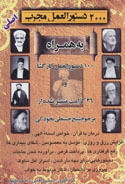کلیپ های دیدنی
مشاوره و خانواده
با توجه به ترک خود ارضایی عوارض آن هنوز در من هست چگونه آن را برطرف کنم ؟
13-08-1399 بازدید:5664 مباحث جنسی و زناشویی همکار پاسخگو

آیا بخاطر وسواس فکری توهین به مقدسات گناه دارد؟
19-05-1398 بازدید:5372 مشکلات و اختلالات روانی همکار پاسخگو
آیا از طریق اینترنت می تواند ازدواج موقت کرد ؟
پرسش: با سلام من 22 سالمه از پارسال با يه دختري در…
از زندگی سیر شدم و آرامش ندارم چکار کنم؟
پرسش : سلام..خواهش ميکنم يه راهي جلو روم بذارين من از…
من از تاریکی شب به دلیل توهمات ذهنیم میترسم چکار کنم؟
پرسش: من وقتي در خانه تنها مي شوم و هوا تاريك…
شب ها كابوس فيلم هاي مبتذل را که قبلا نگاه می کردم میبینم!
پرسش: (در خصوص توبه از ديدن فيلم هاي مبتذل) در اين…
بنده متاهلم و در اینترنت با دختری آشنا شدم که کارمون به گناه کشید!
پرسش: بنده یک مشکلی دارم که می خواستم از شما راهنمایی بخواهم…
جوانی هستم که از زندگی خسته شده و احساس پوچی می کنم!
پرسش: راستش نمی دانم از کجا شروع کنم. 20 ساله هستم…
از طریق اینترنت با پسری آشنا شدم و مدتها با هم در ارتباط بودیم!
پرسش:من دانشجوی ارشد رشته حقوق تقریبا حدود 1 سال پیش…
چرا خانواده ها عاشق شدن را برای جوانان (دختر) بد می دانند؟
پرسش: چرا خانواده ها عاشق شدن را برای جوانان (دختر) بد…
چگونه دیدن فیلم های مبتذل را ترک کنم؟
پرسش: با سلام به حضور حضرت عالي اگرخاطرتان باشد ،من قبلا هم…
با شوهرم قبل از ازدواج رابطه نانشروع داشتم!
پرسش: با سلام من زنی 25 ساله هستم.حدود 1 سال است…
اگر دختری عاشق غیر هم جنس خود...؟
پرسش: اگر دختری عاشق غیر هم جنس خود شود البته نه…
اگر نتوانيم جلو شهوت خود را بگيريم ، چه بايد بكنيم ؟
پرسش: اگر نتوانيم جلو شهوت خود را بگيريم ، چه بايد…
جوانی هستم 21 ساله اهل تهران و تمایل زیادی به سکس دارم
پرسش: من جوانی هستم21 ساله اهل تهران وتمایل زیادی به سکس…
نمي دونم چرا از ازدواج مي ترسم؟!
پرسش: سلام مشکل من اینه که نمي دونم چرا از ازدواج مي…
چرا به زن مطلقه با یک چشم و دید دیگری نگاه می کنند؟!!
پرسش: سلام حاج آقا من یک خانم مطلقه هستم و سوالم اینه…
چرا مخالف رابطه دختر و پسر هستید؟؟!!
پرسش: سلام حاجاقا چند تا سوال داشتم ممنون میشم جواب بدید. 1 چرا…
شب زفاف یا حجله چه شبی است و زن و مرد چکار باید بکنند؟
پرسش: شب زفاف و یا شب حجله که در روایات هم…
چه زمانی برای رابطه جنسی با همسر مناسب است؟
پرسش: چه زمانی برای رابطه جنسی با همسر مناسب است؟ و…
دختری که در سن جوانی و نوجوانی دچار شهوت می شود چه باید بکند؟
پرسش:دختری که درسن جوانی و نوجوانی دچار شهوت می شود…
می خواهم خوب باشم ولی دوست دخترم نمی گذارد!!
پرسش: به دلیل که من مدتی است به شهر آمده ام…
وقتی که عصبانی می شوم دیگر هیچ چیزی دست خودم نیست چکار کنم؟
پرسش: سلام آقای پاسخگو من دارای اخلاق بدی هستم وبا همه خواهر…
من دحتر قبلی نيستم و به يك دختر فاسد تبديل شده ام!
پرسش: من دختري هستم 14ساله من اول دختري سنگين بودم اما…
در مورد وسواسی و راه درمان آن توضیح بفرمایید؟
پرسش: وسواسی چیست و برای درمان آن چه راهکارهایی معرفی می…
خواسگارم بد اخلاق است آیا جواب مثبت بدهم؟
سوال: آیا به پسر بد اخلاق که خواستگاری کرده جواب مثبت…
اخلاقم رُك گفتن است اما حق ميگويم و شوهرم مخالف رفتارم است.
پرسش: اخلاقم رُك گفتن است اما حق ميگويم و شوهرم…
خواستگارم دو ازدواج و یک نامزدی ناموفق داشته جواب مثبت بدم؟
پرسش: خانمی هستم که در گذشته، یک ازدواج_ناموفق داشتم. در حال…
شوهرم گلایه میکنه که چرا همیشه به حرفم گوش میدی!
پرسش: من 20 سالمه 1 ساله ازدواج کردم شوهرم 22 سالشه…
دختر 36 ساله ای که چهره زیبایی ندارد چکار کند؟
پرسش: با سلامدختر 36 ساله اي که مومن و حافظ قرآن…
اختلاف سني پسر با دختر تا چه مقدار ايده آل است؟
پرسش: ميخواستم بدونم ايا ازدواج با دختري که سنش با پسر…
چگونه از انحرافات جنسى به دور باشيم؟
پرسش: در فاصله سنّ بلوغ تا هنگام ازدواج چگونه از انحرافات…
بعضی وقتا اعصابم میریزه بهم با نامزدم بدرفتار میکنم چطورخودمو کنترل کنم؟
پرسش: سلام ببخشید ی سوالی داششتم من دختری۱۸سالم ۷ماهه عقدکردم بعضی…
نقش خانواده در تربيت فرزندان چیست؟
پرسش: نقش خانواده در تربيت فرزندان چیست؟ پاسخ: با سلام و ادب خدمت شما…
نامزدم مي خواهد در كوچه و خيابان آرايش كرده و كمي از موهايم را از روسري بيرون بگذارم!
پرسش: من تا قبل از نامزديم بسيار با حجاب بودم. البته…
چرا برخی مردان در کنار همسرشان آرامش نمی یابند؟
پرسش: قرآن مجيد وجود زن را كانون محبّت و…
علت و شرايط تحقق صيغه چيست؟
پرسش: علت و شرايط تحقق صيغه چيست؟ پاسخ:…
چرا بین دو هوو همیشه اختلاف وجود دارد؟
پرسش: چرا بين دو همسر(زن) با وجود مشروعيّت ازدواج…
پرسش و پاسخ
آیا کسی که شراب بنوشد تا چهل روز نماز و عباداتش قابل قبول نیست ؟
13-08-1399 بازدید:2884 مسائل متفرقه نماز همکار پاسخگو

اذان در جامعه اسلامی نماد چیست ؟ و چرا فقط سه بار در روز تکرار می شود ؟
پرسش: اذان در جامعة اسلامی نماد چیست و…
حکم مشروبات الکلی از دیدگاه اسلام چیست ؟
پرسش: حکم مشروبات الکلی از دیدگاه اسلام چیست…
چرا با این همه ظلم و ستم در جهان امام زمان (عج) ظهور نمی کند ؟
پرسش: چرا با این همه ظلم و ستم…
اگر نگاه به نامحرم گناه است چرا در فیلمهای خارجی زنهای بدون حجاب را نشان میدهند؟
پرسش: چرا میگویند نگاه کردن به نامحرم گناه…

با چه شیوه هایی میتوانیم پیرو انبیاءالهی باشیم ؟
پرسش : چه راه و روشی را پیبگیریم…
چرا زرتشتیان به اعتقاداتشان پایبند هستند ولی مسلمانان نه؟
پرسش : چرا در دین زرتشت گفتار نیک،…
چرا معانی دقیق آیات قرآن مشخص نیست و نیاز به تفسیر دارد ؟
پرسش : به چه دلیل تا تفسیرهای متعدد…
آیا جهت انجام هر کار نامشروعی می توان صیغه جاری کرد ؟
پرسش : اهمیت صیغه کردن در چیست؟ با…
اگر پیامبر (ص) عرب زبان نبود آیا قرآن باز هم به زبان عربی نازل می شد؟
پرسش : اگر حضرت محمد(ص) زبان دیگری به…
آیا در بین پیامبران ،پیامبر خشن هم وجود دارد؟
پرسش : پیامبران به مهربانی معروف میباشند آیا…
با توجه به محاسن روزه آیا معایبی هم در آن هست ؟
پرسش : روزه محاسن بسیاری دارد، آیا این…
جنس خداوند از چه چیزی می باشد و خدا چیست؟
پرسش : جنس خداوند از چه چیزی میباشد…
معنی خدا چیست؟چرا خداوند از حروف دیگر استفاده نکرده است؟
پرسش : تعریف لغوی خدا چیست و چرا…
خال کوبی ابرو (تاتو )از نظر شرعی برای وضو و غسل چه حگمی دارد ؟
پرسش : خالکوبی ابرو (تاتو) از نظر شرعی…
شنیدن صدای زنان در مراسم عزاداری و مولودی چه حکمی دارد ؟
پرسش : شنیدن صدای زنان در مراسم عزاداری…
در چه صورتی امر به معروف و نهی از منکر واجب می شود؟
پرسش : در چه صورتی امر به معروف…
چرا در ایران مردی که از دین خود برگردد حکم اعدام را دارد ؟
پرسش: چرا در ایران مردی که از دین…
آیا ازدواج زن شیعه با مرد سنی اشکال دارد؟
پرسش : آیا ازدواج زن شیعه با مرد…
لمس آیات قرآنی که بر سنگ قبر نوشته شده است بدون وضو چه حکمی دارد ؟
برسش : لمس آیات قرآنی که بر سنگ…
فرق بین احتیاط واجب و احتیاط مستحب چیست؟
پرسش : فرق بین احتیاط واجب و احتیاط…

آیا با زیارت امامان و بوسیدن ضریح آنان انسان دچار شرک می شود؟
پرسش : آیا اعتقاد به این که شیعیان…

چرا در نماز از مهر استفاده میکنیم و فقط پیشانی بر خاک قرار می دهیم؟
پرسش : با توجه به این که هنگام…
آیا علائم هنگام ظهور امام زمان (عج) واقعیت دارد؟
پرسش : آیا وجود نشانههایی هنگام ظهور حضرت…
با وجود مساوات بین زن و مرد چرا مردان در اولویت قرار دارند؟
پرسش : با توجه به این که ما…
طریقه خواندن نماز در زمان رسول خدا (ص) چگونه بوده است؟
پرسش : طریقه نماز خواندن از زمان رسول…
چگونه می توانیم از گناه غیبت پرهیز کنیم؟
پرسش : چگونه میتوانیم از گناه غیبت پرهیز…
چگونه از بدخلقی و صفات زشتم دوری کنم؟
پرسش : چه راهی وجود دارد که انسان…
قطع رابطه با اعضای خانواده که از نظر شخصیتی و اجتماعی مشکل دارند گناه است؟
پرسش : آیا قطع رابطه با افراد خانواده…
آیا روح انسان بعد از مرگ در جسم دیگری دمیده می شود و دوباره به زندگی میکند؟
پرسش : آیا این نظریه درست است که…
اینکه در نماز کاهلی میکنم آیا در دینم خللی ایجاد می شود؟
پرسش : خدا را خیلی دوست دارم،همیشه در…
دلیل علاقه خاص به بعضی از امامان چیست؟
پرسش : چرا برخی برای بعضی امامان ارادات…
در شب اول قبر چه سوالاتی از ما پرسیده می شود ؟
پرسش : شب اوّل قبر چه سئوالاتی از…
آیا دوست داشتن یک نا محرم و ارتباط با او گناه است؟
پرسش : اگر کسی را واقعاً از صمیم قلب…
آیا ادعای ملاقات امام زمان (عج) از جانب برخی افراد صحت دارد ؟
پرسش : بر اساس روایتهای فراوانی امام زمان(عج)…
چرا به اصول و قواعد دین اسلام توجه نمی شود و پذیرش آن از سوی پیروان ادیان دیگر سخت است…
پرسش : دین اسلام کاملترین دینهاست و آسانترین…
آیا نظریه تناسخ از دیدگاه اسلام پذیرفته شده است ؟
پرسش : آیا نظریه تناسخ که بزرگان زیادی…
دست نوشته های طلبه پاسخگو

برای احترام به این ماه هم که شده این کار را انجام بده. مطمئن باش که یاد خدا باعث می شود که هیچوقت به سمت آن اشتباهات نروی.
برای همین یک ماه هم که شده از آن ها صرف نظر کرد و در ضیافت خدا شرکت بنما. بعد از این یک ماه، کیفیت زندگی ات را با گذشته مقایسه کن.
اگر بدتر شده بودی، دوباره به سمت آن گناهان و اشتباهات برو. ولی این ماه چنان عشقی به تو می دهد که دیگر زندگی ات به مانند گذشته نخواهد شد. این ماه خداوند تو را با عشق پذیرایی می کند.
Islam Attacks Slavery 1
Islam Attacks Slavery 1
Islam has often been represented by Christian writers as a religion which not only tolerated slavery but also encouraged it. This is a serious accusation leveled against Islam, and in this book I propose to show its falsity. I would have taken, if possible, the charitable view that the charge against Islam is based on ignorance of facts, but I am grieved to note that in majority of the critics the overflowing motive seems to be prejudice, and malice.
We have mentioned briefly the attitude of Christianity towards slavery, and more will be said afterwards. Here, to begin with, let us have a look at Islam and its codes.
As far as slavery was concerned, Arabs in the pre-Islamic days were as bad offenders as their neighbors. Slaves were a commercial commodity, and slavery was an established institution. It was a source of livelihood for thousands and a source of labour for scores of thousands. To the elite, the number of slaves in the household was a symbol of status.
This was the state of affairs at the advent of Islam. Slavery offended the spirit of Islam as much as idolatry did. But while the latter had its roots in spiritualism and hence could be countered by reason, slavery had its roots in commerce, in social structure, in agriculture undertakings; and reason alone was but a feeble weapon against a foe so insidious and so deeply rooted. How was then slavery to be eradicated?
The ill-informed may well suggest that the Prophet of Islam could have used force. But the ineffectiveness of force for such purpose is well recognized by all dispassionate students of sociology. Force may achieve submission but it inevitably achieves hostility, and very often hostility is so fierce that many a good cause has been lost when force has been employed for its advancement.
The sad plight of the Negroes of America is but one illustration of how ineffective the employment of force can be when the object is to achieve a social reform. The emancipation of slaves did not change the attitude of the white masters towards their ex-slaves; and what a bitter legacy of racial antipathy has it left! Toynbee writes, “The Blacks in the United States who were emancipated juristically in 1862 are, with good reason, feeling now, more than a century later, that they are still being denied full human rights by the white majority of their fellow-citizens.(1)
Islam's war against slavery aimed at changing the attitude and mentality of the whole society, so that after emancipation, slaves would become its full-fledged members, without any need of demonstrations, strikes, civil disobedience and racial riots. And Islam achieved this seemingly impossible objective without any war. To say that Islam waged no war against slavery would not be a true statement. A war it waged, but a war in which neither sword was resorted to, nor blood was spilled.
Islam aimed at striking at the roots of its foe and created allies by arousing the finer instincts of its followers. A three-pronged attack on slavery was launched.
Firstly, Islam placed restrictions on acquisition of slaves. Prior to Islam, slavery was practiced with abandon. Debtors were made slaves, war captives were either killed or made slaves. In weaker nations, people were hunted like animals, killed or captured and reduced to slavery. Islam, in unambiguous terms, forbade its followers to enslave people on any pretext. The only exception was an idolatrous enemy captured in a war which was fought either in self-defense or with the permission of the Prophet or his rightful successors. This exception was, in words of Ameer Ali, “in order to serve as guarantee for the preservation of the lives of the captives.”(2)
As 'Allamah Tabataba'i has described at great length, prior to Islam strong and dominant people, throughout the world, used to enslave weak persons without any restraint. Important among the “causes” of enslavement were the following three factors:
1. War: The conqueror could do with the vanquished enemy whatever he liked. He could put the arrested soldiers to death, condemn them to slavery or otherwise keep them under his authority or clutch.
2. Domination: A chief or ruler could enslave, depending on his sweet wish, anyone residing under his domain.
3. Guardianship: A father or grandfather had absolute authority over his offspring. He could sell or gift him or her away; could lend him or her to someone else, or exchange him or her with another's son or daughter.
When Islam came on the scene, it nullified and negated the last two factors completely. No ruler or progenitor was allowed to treat his subjects or offspring as his slaves. Every individual was bestowed with well-defined rights; the ruler and the ruled, the progenitor and the offspring had to live within the limits prescribed by religion; no one could transgress those limits.
And it drastically restricted the first cause, i.e., war, by allowing enslavement only in a war fought against unbelieving enemy. In no other way could anyone be enslaved. At the same time, Islam raised the status of slavery to that of a free man; and opened many ways for their emancipation.(3)
Before slave trade was started on a large scale by the Westerners (when colonisation began), it was only in wars that men were made captives. But Islam did not permit wars of aggression. All the battles fought during the life-time of the Prophet were defensive battles. Not only this, an alternative was also introduced and enforced:
“…..to let the captives go free, either with or without any ransom “.
In the battles forced upon the Muslims, the Prophet had ordered very humane treatment of the prisoners who fell into Muslim hands. They could purchase their freedom on payment of small sums of money, and some of them were left off without any payment. It all depended upon the discretion of the Prophet or his rightful successors, keeping in view the safety of the Muslims and the extent of danger from the enemy. The captives of the very first Islamic battle, Badr, were freed on ransom (in form of money or work like teaching ten Muslim children how to read and write), while those of the tribe of Tay were freed without any ransom.
Even in such enslavement, a condition was attached that a mother was not to be separated from her child, nor brother from brother nor husband from wife nor one member of a clan from his clan. The Prophet and the first Shi'ite Imam, 'Ali bin Abi Talib, prescribed severest penalties for anyone who took a free man into slavery: cutting off the hand of the culprit.
Ameer Ali writes in Mohammedan Law:
The possession of a slave by the Quranic laws was conditional on a bona-fide war, waged in self-defense, against idolatrous enemies; and it was permitted in order to serve as a guarantee for the preservation of the lives of the captives.. Mohammad found the custom existing among the pagan Arabs; he minimized the evil, and at the same time laid down such strict rules that but for the perversity of his followers, slavery as a social institution would have ceased to exist with the discontinuance of the wars in which the Muslim [sic] nation were at first involved.
The mutilation of the human body was also explicitly forbidden by Mohammad, and the institution which flourished both in the Persian and the Byzantine empires was denounced in severe terms. Slavery by purchase was unknown during the reigns of the first four Caliphs, the khulafai-rashidin, 'the legitimate Caliphs' as they are called by the Sunnis. There is, at least, no authentic record of any slave having been acquired by purchase during their tenure of office. But with the accession of the usurping house of Ommeyya [sic] a change came over the spirit of Islam.
Mu'awiyah was the first Muslim sovereign who introduced into the Mohammedan world the practice of acquiring slaves by purchase. He was also the first to adopt the Byzantine custom of guarding his women by eunuchs. During the reign of the early Abbasides the Shi'a Imam Ja'far al-Sadiq preached against slavery, and his views were adopted by the Mu'tazila. Karmath, who flourished in the ninth century of the Christian era. seems to have held slavery to be unlawful.
Thus, we see that the earnest attempt of Islam to stop its followers from acquiring new slaves was foiled by Banu Umayyah. And I must record to the lasting disgrace of a large number of Muslims that, in later times, they utterly ignored the precepts of the Prophet and the injunctions of the Qur'an, and the Arabs too participated with the European Christians in the abominable slave-trade of East Africa. The West African slave-trade was totally in the hands of the European Christians.
Continue in the next article: ( Islam Attacks Slavery 2 )
NOTES:
1. Toynbee, A. J., Mankind and Mother Earth, (N.Y.: Oxford University Press, 1976), p.12.
2. Ameer Ali, Muhammadan Law, vol.2, p.31.
3. al-Tabataba'i, Sayyid Muhammad Husayn, al-Mizan fi Tafsir'l Qur'an, vol.16, 2nd ed. (Beirut, 1390/1971), pp. 338-358.
4. (The Qur'an 47:4)
5. al-Waqidi, Muhammad bin 'Umar, Kitabul Maghazi, ed. M. Jones, vol. I (London: Oxford University Press, 1966), p.129; Ibn Sa'd, al-Tabaqatul Kabir, Vol. II:1 (Leiden: E.J. Brill, 1912), pp.11, 14.
6. Ameer Ali, Muhammadan Law, vol. 2, pp. 31-2.
وبگــــــــــردی طلبۀ پاسخگو
- فایل اعمال و رفتار های خلاف قانون جناب آقای حسن روحانی
- در کنج خانه طلبهها چه میگذرد؟
- سکوت چند ساله مسئولان حوزه در قبال حملات وحشیانه به طلاب!
- می گویند که مملکت مملکت آخوندهاست!!
- یک ماجرای تلخ که خانم ها با تأمل بیشتر بخونند
- جریان های تکفیری موجود در عراق و نحوه شکل گیری آنها
- سیر تکاملی تفکر سلفیه چگونه بوده است؟
- بداء در قرآن و حدیث چگونه مطرح شده است؟
- پیامبر (ص) با مخالفین خود چگونه بر خورد می کرد؟
- سبک زندگی حضرت زهرا سلام الله علیها
- ملاک کرامت و شرافت افراد، انسانیت است یا جنسیت؟
- رنگ و پوشش های رنگی در اسلام
- حجاب، زنان را افسرده میکند و مانع پیشرفت اجتماعی آنهاست!!!
- علوم لدنی معصومین
- مگر ولی فقیه معصوم است که ولایت مطلقه دارد؟
- اگر خدا ازعاقبت ما اطلاع دارد قیامت برای چیست؟
- آیا بجای نماز خوندن، پیانو یا سه تار بزنم؟
- چرا مراسم عزاداري امام حسين(ع) پيش از شهادت ايشان صورت ميگيرد؟
- چرا امام حسين(ع) در كربلا براي رفع تشنگي از خداوند طلب باران نكرد؟
دانــــــلود های مفیـــــــــــــــــــد
- دانلود پاورپوینت شناخت وهابیت و صهیونیسم و ارتباط با همدیگر
- دانلود دو پاورپوینت اجرای عید غدیر خم
- دانلود پاورپوینت احتجاج اميرمؤمنان (ع) به غدير
- پژوهشی در کلام و پیام مقام معظم رهبری پیرامون ماه رمضان
- خطبه شعبانیه و خطبه امیرالمومنین(علیه السلام) پیرامون روزه و ماه رمضان
- دانلود پاورپوینت و pdf تفاوت های زن و مرد
- دانلود جزوه ساعات سعد و نحس(زمان نوشتن دعا)
- تقویم مذهبی شمیم یار 96 مخصوص کامپیوتر
- دانلود نرم افزار «شیعه شناسی»
- دانلود پاورپوینت ساختار خانواده و مسایل آن
- دانلود کتاب دایره المعارف جنسی
- دانلود نکات جذاب دوران عقد
- دانلود کتاب درمان سرد مزاجی و بی میلی جنسی بانوان
- دانلود کتاب حسادت کودکان
- دانلود کتاب درمان خستگی وناتوانی جنسی
- دانلود پاور پوینت اسیب های ازدواج وخانواده
- دانلود پاورپوینت هشت گام برای تحقق رویا به واقعیت
- دانلود پاورپوینت تقویت اراده
- دانلود پاورپوینت موفقیت وروشهای رسیدن به ان
- دانلود پاورپوینت هنر رفتار با افراد دشوار
- دانلود پاورپوینت جملات جالب وجذاب روحیه بخش بزرگان
- دانلود پاورپوینت راههای مقابله ودرمان استرس
- دانلود پاورپوینت نیازهای اساسی کودکان
منبــــرهای مکــــــــــــــــــتوب
- منبر مکتوب: روز عرفه و فرصت ها
- منبر مکتوب: سبک زندگی امام باقر علیه السلام
- منبر مکتوب: سه نیاز مومن (امام جواد علیه السلام)
- سخنرانی سلسله ای و چند جلسه ای مناسبت ماه رمضان
- دانلود 30 جلسه سخنرانی ماه مبارک با موضوع تنها مسیر
- موضوعات پیشنهادی سخنرانی برای محرم
- فضائل حضرت قمر بنی هاشم علیه السلام
- برکات وجود ابا عبدالله علیه السلام بر عالم
- بررسی بُعد اخلاقی،عبادی و عرفانی عاشورا
- آخرين وصيت امام حسين عليه السلام
- اولین علت رویاروی در کربلا؛ دوری از یاد خدا
- هميشه حزن؟ شادي چرا نه؟ - شب دهم محرم
- چرا نفرين ؟ - شب نهم محرم
- نماز ظهر عاشورا - شب هشتم محرم
- فلسفه عزاداری - شب هفتم محرم
- دفاع از دین - شب ششم محرم
- فلسفه حضور خانواده سيد الشهداء - شب پنجم محرم
- علم امام علیه السلام به شهادت - شب چهارم محرم
- فقدان شرایط امر به معروف و نهی از منکر- شب سوم محرم
مناظرات طلبه پاسخگو
بیشترین دانلود ها
- دانلود صوتي تکنیک های نزدیکی زن و شوهر (108215)
- دانلود رایگان کتاب خواص سوره های قرآن (55131)
- دانلود پاورپوینت بسیار مفید مهارت های زندگی (37711)
- دانلود پاورپوینت و pdf تفاوت های زن و مرد (34325)
- دانلود كتاب مسائل جنسي و زناشوئي در احاديث (33978)
- دانلود کتاب دایره المعارف جنسی (32371)
- دانلود پاورپوینت های آموزش پیش از ازدواج (30790)
- دانلود بسیار مفید پاورپوینت آئین همسرداری (30208)
- دانلود 110جلد کتاب بحارالانوار علامه مجلسی ره (29862)
- دانلود پاورپوینت آموزشی بررسی رابطه دختر و پسر (29841)
- دانلود كتاب دختران خوب به آسمان می روند دختران بد به همه جا (28744)
- دانلود کتاب درمان سرد مزاجی و بی میلی جنسی بانوان (28533)
- دانلود کتاب آموزش جنسی آقایان (28527)
- دانلود كتاب فرق و مذاهب كلامي استاد رباني گلپايگاني (28455)
- دانلود نکات جذاب دوران عقد (28068)
- دانلود نرم افزار «شیعه شناسی» (26437)
- دانلود کتاب درمان خستگی وناتوانی جنسی (25621)
- دانلود پاورپوینت تقویت اراده (24077)
جدیدترین مطالب سایت
- پاسخ به شبهات ولایت (4779) بازدید
- پاسخ به شبهات ولایت (4577) بازدید
- اذان در جامعه اسلامی نماد چیست ؟ و چرا فقط سه بار در روز تکرار می شود ؟ (3944) بازدید
- باتوجه به عادل بودن خداوند چرا بعضی از انسانها را ناقص الخلقه آفریده است ؟ (4025) بازدید
- ویژگی خاص قرآن چیست که کسی نمی تواند مانند آن را بیاورد ؟ (4311) بازدید
- با توجه به ترک خود ارضایی عوارض آن هنوز در من هست چگونه آن را برطرف کنم ؟ (5664) بازدید
- آیا بدن اخروی مانند بدن مادی است ؟چهره ی واقعی انسان در قیامت چگونه است ؟ (5107) بازدید
- آیا ادعای ملاقات امام زمان (عج) از جانب برخی افراد صحت دارد ؟ (4608) بازدید
- چرا به اصول و قواعد دین اسلام توجه نمی شود و پذیرش آن از سوی پیروان ادیان دیگر سخت است ؟ (4998) بازدید
- فلسفه وجود لباس روحانیت در عصر حاضر چیست ؟ (3600) بازدید
- آیا وظیفه یک روحانی تنها راهنمایی مردم و فعالیت و تدریس در حوزه هاست ؟ (2991) بازدید
- آیا نظریه تناسخ از دیدگاه اسلام پذیرفته شده است ؟ (5357) بازدید
- آیا توصیف بهشت و جهنم در قرآن تمثیل هایی برای درک بهتر آن جهان است ؟ (4940) بازدید
- با توجه به اینکه اسلام کاملترین دین هست چرا ما نسبت به کشور های غیر مسلمان عقب مانده تر هستیم ؟ (6856) بازدید
- نقش امام و رهبر در جامعه اسلامی چیست ؟ و اگر نباشد چه اتفاقی می افتد ؟ (4625) بازدید
پربازدیدترین های سایت
- زنی هستم که میخواهم به شوهرم خیانت کنم!!! (605535)
- آيا زن شوهر دار بخاطر رفع نیاز جنسی اش ميتواند صیغه شود؟ (501174)
- دوست دخترم حامله شده چکار کنم؟ (398714)
- میل جنسی زیادی دارم و به شدت داره منو عذاب می ده (340741)
- دیدن فیلم های مبتذل زن و شوهر برای تحریک شدن جنسی (217932)
- چگونه همسرمان را آماده آميزش جنسي كنم؟+18 (213232)
- حکم شرعی نزدیکی از پشت! (208246)
- خانم هایی که می خواهند طلبه شوند بخوانند!!! (205745)
- زنم رابطه جنسی برقرار نمیکند!!! (199746)
- از تجربه های تلخ و تکان دهنده دختران بخوانید شاید... (172474)
- گناه با محارم خود داشتم! (146480)
- رابطه جنسی دهانی حكم چيست؟ (131077)
- محرمات و مکروهات و مستحبات حائض+حکم ورد به امکان مقدسه (129587)
- به رابطه خانمم با خواهر زاده اش مشکوکم؟ (123505)
- سفارش اسلام در مورد آمیزش صحیح چیست؟ (99136)
- نام كتاب حضرت نوح و حضرت ابراهیم؟ (97169)
- با زنان چشم سبز ازدواج نکنیم؟ (94955)






















































